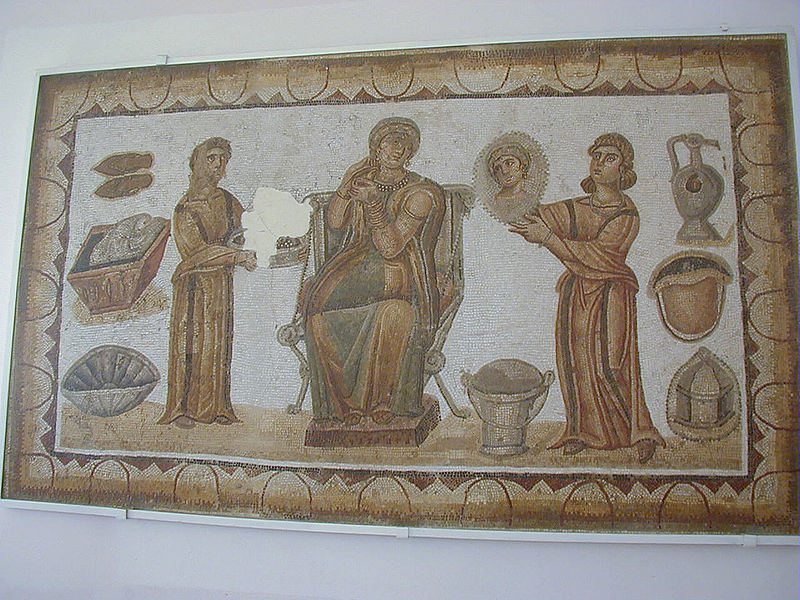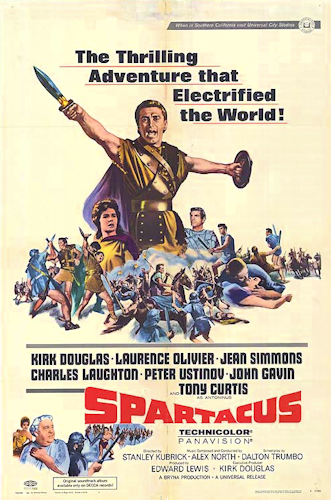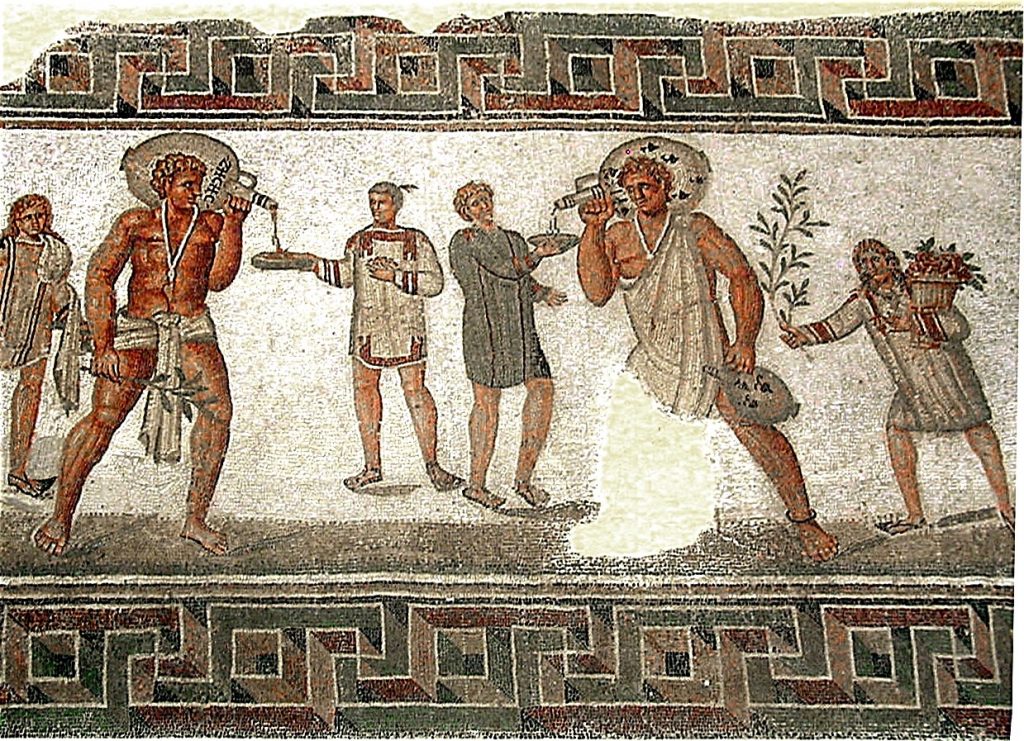Slavery in Ancient Rome Posted by andregurgel on Feb 8, 2019 in Intro to Latin Course, Latin Language, Roman culture
Note: This blog post is a companion to Unit I of our Introduction to Latin Vocabulary course. You can learn more about the course here.
The Romans constituted one of the greatest civilizations in the ancient world. Whether you are British, German or Italian, their legacy lives on in all of us. They produced great thinkers like Cicero, Seneca and Rufus. On the other hand, those thinkers and philosophers thought that slavery was morally acceptable! In fact, many centuries before Rome started its expansion, the natural-slave theory was defended by Aristotle himself, one of the greatest Athenian philosophers.
As you probably know, a slave’s life in Rome was mostly full of pain and suffering, working many hours per day without payment. Most Romans didn’t even see them as human beings, being considered mere res (things). Were you aware, however, that there were different kinds of slaves in Rome? And in some exceptional cases, their lives may even have been better than an ordinary plebeian’s!
Urban Slaves
Some scholars believe that slavery was the foundation of Roman society. It is estimated that one in three of the population of Italy or one in five across the empire were slaves. Can you believe that? Whether you went to a huge city like Rome or to a faraway village in the country, you would see slaves everywhere! If you were in the city of Rome, you would notice how slaves were employed in all kinds of jobs. They could be shoemakers, engravers, or prostitutes, but they could be teachers as well! They were called ‘paedagogoi’, very expensive Greek slaves hired by rich families to educate their children.
Farm Slaves
In the early days, Rome probably didn’t have many slaves to work in the fields. Small farms in the country were cultivated for the most part by the pater familias (lord of the household) and his own family. When Rome eventually began its rapid military expansion, they needed many more people to work in the fields. Roman citizens were constantly called away from their work to serve in the legions, so Roman land began to be cultivated almost entirely by slave labor.
Farm slaves would receive peculium (payment), which was often paid in kind such as livestock or a garden for the slaves use.
Vernae: Household Slaves
Vernae was the Latin name used to describe the slaves who were born within the household. The etymology of verna is not very clear. It’s probably a cognate of the Sanskrit वास्तु (vā́stu, “house”) and the Ancient Greek ἄστυ (ástu, citadel). The word might also have been borrowed from Etruscan. Roman Law didn’t authorize slaves to get married (ius connubii) but cohabitation was known as contubernium. The offspring of two household slaves would also become a verna (household slave).
The distinction between the vernae and other slaves appears very often in Latin literature and is evidence that they were often treated well by their masters. Some masters even erected funeral stones in honor of their vernae, such as Claudia Helpis who erected a stone to commemorate the passing of her slave Veneria. The Romans probably felt that vernae were more trustworthy than other types of slaves.
It has been suggested that Cicero’s personal slave Tiro was a verna. The slave is often mentioned in the statesman’s correspondence in which he shows concern for Tiro’s health. As a matter of fact, when I read it, I often think that they were actually good friends. Cicero knew quite a lot about friendship, since he wrote in his work on friendship (De Amicitia) that vere amicitiae sempiternae sunt (true friendships are eternal). Therefore Cicero probably never saw Tiro as a slave in the first place and he eventually freed and educated him. Tiro became his biographer and wrote many other works (all lost to us, sadly!). Was Cicero perhaps the first Roman thinker to defend the idea that no one deserved to be a slave? Well, he never defended such a progressive idea in his works, but based on his relationship with Tiro, I certainly think so!
Gladiators
The word gladiator comes from the noun gladius (sword), one of the most common weapons used by the fighters. Gladiators were typically prisoners of war, captured during the many Roman campaigns, but Roman citizens could volunteer to become gladiators to pay off their debts. When the Romans realized that a prisoner of war could be useful as a gladiator, he would receive proper training in order to become a fighting machine for the entertainment of the audience (they would even bet on gladiators!). They were forced to fight against other gladiators and wild beasts. Unlike other kinds of slaves, when gladiators fell ill or were wounded in the arena, their lanistae (slave owners) hired the best doctors, like Claudius Gallenus (personal physician of Marcus Aurelius) who started his career as a surgeon to gladiators.
The harsh conditions of slavery caused a number of revolts in Rome which became known as the Servile Wars. The most famous one was headed by the Thracian slave Spartacus and his commanders Crixus, Gannicus and Onomaeus (in fact, I recommend watching the film Spartacus, starring the great Kirk Douglas). The rebel gladiators started assembling all sorts of slaves and mustered an army which shook the very foundations of the Roman Republic. After many years of plundering the Italian Peninsula and significant victories, such as the Battle of Mount Vesuvius, the rebel slaves were defeated by the Roman general Crassus (though Pompey took credit for it!). Over six thousand prisoners were crucified along the Via Appia.
Servi Poenae
The word servus, which is the origin of English words like ‘servant’, comes from the Latin servire (‘to serve’). The word poena means “guilt, penalty”. Therefore, the phrase servus poenae was used for people who were sentenced to become slaves and work in the mines (Damnati in metallum, condemed (in) to the mines). Life in the mines was notoriously brutal and was essentially a death sentence. As we have seen for gladiators, slavery wasn’t exclusive to non-Romans. If a Roman citizen owed money to the State and wasn’t able to pay off his debt, he could be condemned to lose his freedom. It was the worst fate for someone, as, unlike other slaves, people condemned to become servi poenae couldn’t be freed, which means they would be slaves for life!
Servi Publici
Although slaves could be owned by private individuals, there were slaves who didn’t belong to a specific person, but to the Roman state. They were employed to work in the offices of magistrates and temples. They would usually perform minor duties. Their job was to build roads and other buildings, as well as to repair and maintain infrastructure such as the aqueducts that supplied Rome with fresh water. Other public slaves worked as clerks and tax collectors for the city. Some slaves could rise to higher ranks and do secretarial work or bookkeeping. A good historical example was Cleander who became an official of the imperial household during the rule of Emperor Commodus. After he became a freedman, he rose to be a special advisor to the emperor. On the other hand, Cleander eventually was found guilty of causing a huge famine in the empire and the emperor had him executed.
Manumissio: How Slaves Became Free
In many cases, slavery could be for life, but, for some lucky slaves, there was a light at the end of the tunnel! Vernae and servi publici would often receive a small wage, by means of which they could later buy their freedom. When slaves received their freedom, this act was called manumissio and they would become liberti (freedmen). They never had the same rights as a freeborn Roman citizen however. They weren’t allowed to run for public office and were still bound to their former dominus (master). On the other hand, some liberti grew extremely wealthy. A good example of a libertus shows up in the Satyricon in the character Trimalchio.Slavery lasted for many centuries after the fall of the Roman Empire. It’s a sad stain on the history of mankind which only ended in the nineteenth century (at least in the Americas) thanks to the abolitionist movement. To quote the great epic poem “The Brus” by John Barbour, “Fraedom is a noble thing!”
GLOSSARY OF LATIN WORDS AND TERMS
verna – House slaves. Slaves born within the household
ius connubii – right of getting married
gladius – a short sword.
dominus – lord, master
libertus – freedman. plural ‘liberti’
contubernium – marriage of slaves, a permitted cohabitation.
servus publicus – slave who belonged to the Roman state.
pater familias – head of a Roman family
lanista – gladiator trainers.
via Appia – one of the earliest and most important Roman roads. It connected Rome to Brindisi, in southeast Italy.
Satyricon – a novel by the Roman writer Petronius.
paedagogus -a slave who taught the sons of Roman citizens.
REFERENCES
Remains of Old Latin. Loeb Classical Library. Translated by E.H. Warmington
Martial, Epigrams. Loeb Classical Library

Build vocabulary, practice pronunciation, and more with Transparent Language Online. Available anytime, anywhere, on any device.







Comments:
Denny Smith:
Thank you for the well-written essay. Yes, slavery was a stain on human history, and the irony is monumental for America, the redeemer of ancient democracy, would be the last great power to tolerate slavery. So sad, as well, the Aristotle, the wellspring of western intellectual inquiry, considered slaves to be machines with souls!
Starz, the digital movie firm, released a great series called “Spartacus” that surpasses the old movie, by far.
Kurt R. Fiedler, M,D,:
a refreshing chapter of Roman history and an enlightening social Roman law—sent more similar historical events of daily life ! vale–carpe diem—sic transit gloria mundi!
aqua et panis est vita canis ?
Merci, Dr. Med. K.R. Fiedler , M.D.